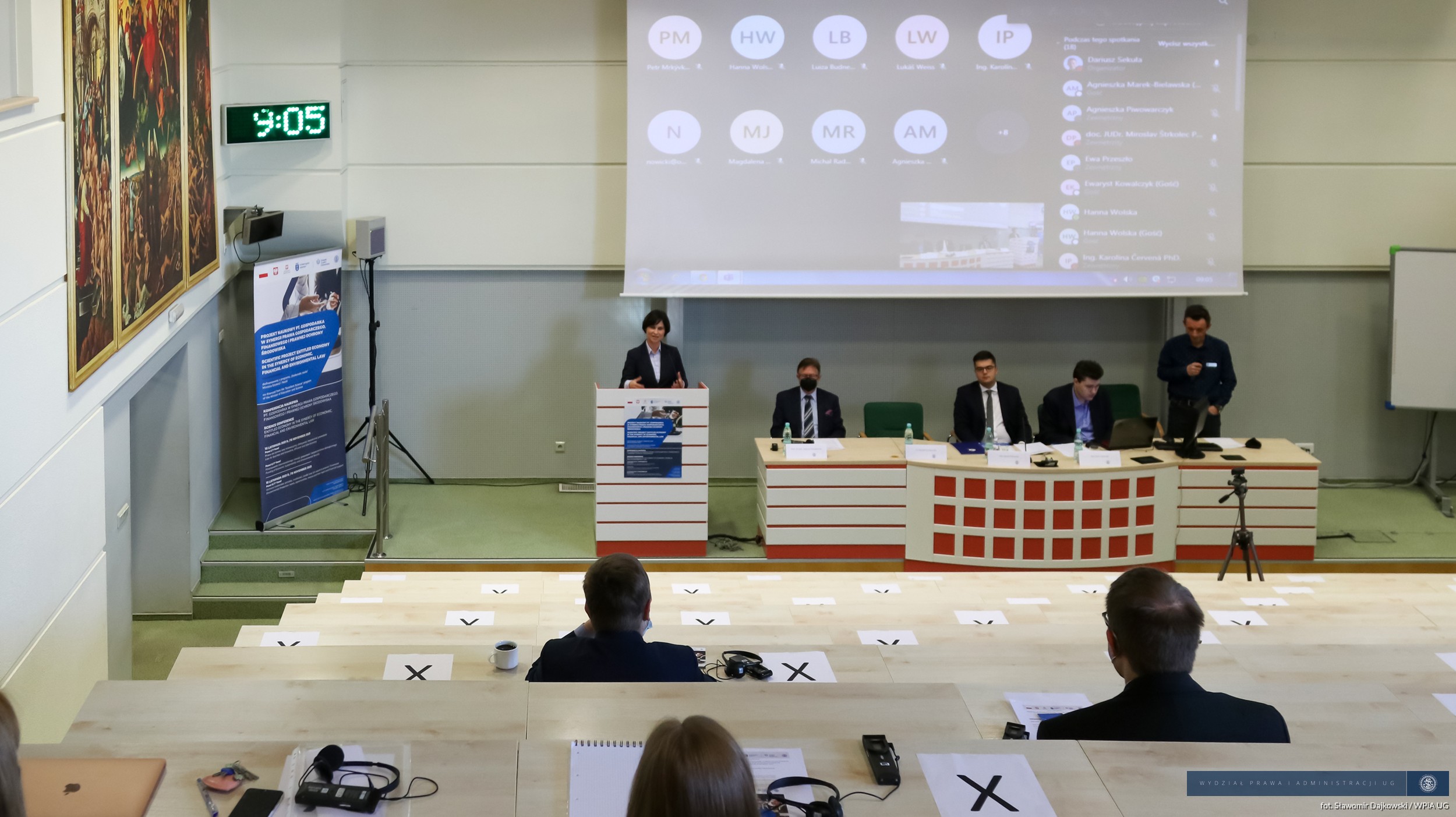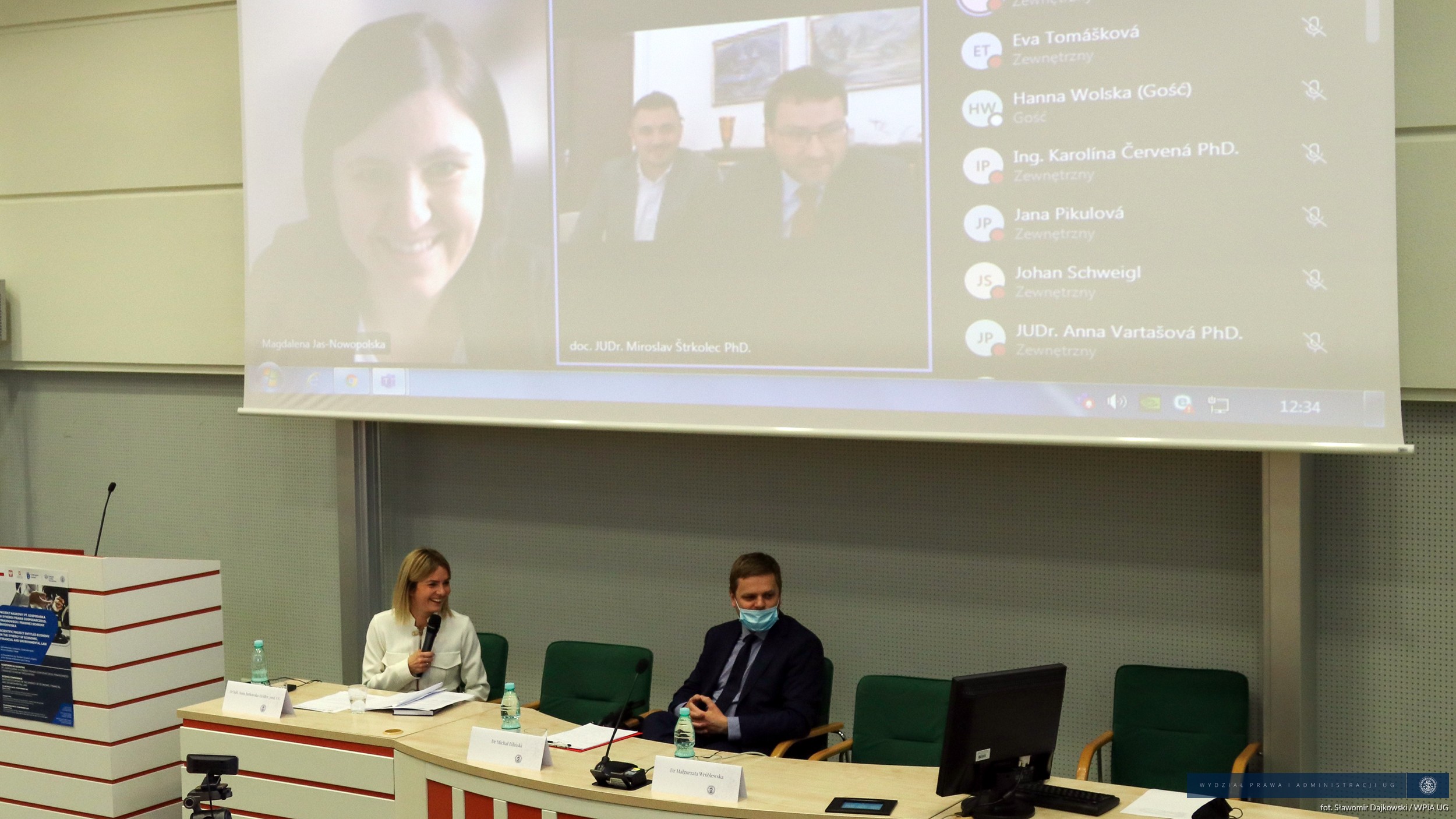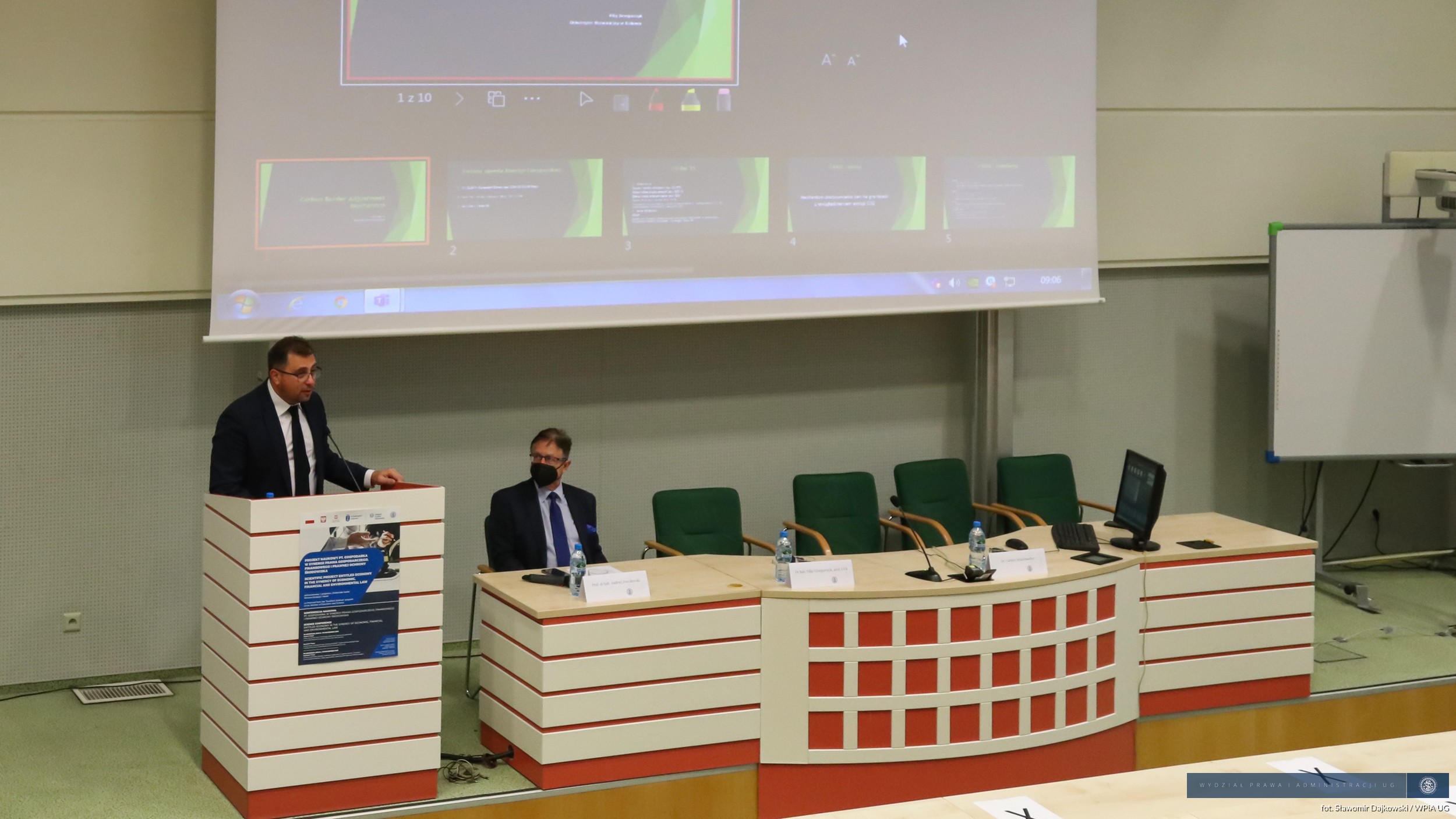International Scientific Conference on "Economy in the Synergy of Economic, Financial and Environmental Law"
On November 18-19, 2021, an international scientific conference was held at the Faculty of Law and Administration of the University of Gdańsk on the issues of mutual connections and the effects of regulations on economic, financial and environmental law. This conference was attended by representatives of universities from five countries - the Czech Republic (Masaryk University in Brno and Pavel Jozef Šafárik University in Košice), Germany (University of Gießen), Poland (University of Economics in Kraków, University of Gdańsk, Jagiellonian University in Kraków, Nicolaus Copernicus University in Toruń, University of Silesia in Katowice, University of Warmia and Mazury in Olsztyn, WSB University in Gdańsk), Slovakia (Comenius University in Bratislava) and Hungary (Széchenyi István University in Győr).
The conference was one of the scientific activities carried out as part of an international research project supported by the Minister of Education and Science within the "Excellent Science" program.
The chairman of the Organizing Committee of the Conference was prof. dr hab. Andrzej Powałowski. Dr Hanna Wolska acted as the Deputy Chair of the Conference Organising Committee. The Organizing Committee of the Conference also included: dr hab. Anna Dobaczewska, prof. UG; dr hab. Anna Jurkowska-Zeidler, prof. UG; dr hab. Maciej Nyka, prof. UG and mgr Joanna Kiraga.
In addition, the members of the Scientific Committee were: Prof. JUDr. Marián Vrabko, CSc from the Comenius University in Bratislava; Doc. JUDr. Petr Mrkývka, PhD from the Masaryk University in Brno; JUDr. Gábor Hulkó, PhD from the Széchenyi István University in Győr; dr hab. Ewa Przeszło, prof. UŚ of the University of Silesia in Katowice; dr Michał Biliński from the Jagiellonian University in Kraków and dr Magdalena Jaś-Nowopolska from the University of Gießen.
The conference began with the official welcome of the participants by the Vice-Dean for Education of the Faculty of Law and Administration of the University of Gdańsk dr hab. Małgorzata Balwicka-Szczyrba, prof. UG.
The first panel entitled "Law for business and an innovative, efficient and secure economy", addressed the assumptions that the law should meet in order to support entrepreneurs and the objectives pursued by the economy. Speakers on this panel were: Doc. JUDr. Petr Mrkývka, PhD from the Masaryk University in Brno; dr hab. Henryk Nowicki, prof. UMK of the Nicolaus Copernicus University in Toruń; Assoc. prof. Dr. Gábor Hulkó, PhD from the Széchenyi István University in Győr; dr hab. Péter Király from the Széchenyi István University in Győr; dr Michał Krzykowski from the University of Warmia and Mazury in Olsztyn; mgr Jakub Plebański from the University of Gdańsk and mgr Piotr Gajewski from the University of Gdańsk.
The panel was opened by prof. dr hab. Andrzej Powałowski who introduced the participants to the assumptions of economic synergy, pointing to the need to ensure economic efficiency on the part of entities operating in the economy, while emphasizing the aspects of environmental protection.
Doc. JUDr. Petr Mrkývka, PhD in his speech "Synergism in the regulation of public financial activity" pointed out that so far the phenomenon of synergism has rarely been given attention in legal sciences, and in particular the mutual influence of various branches of law has not been noticed. This lecture included a presentation of the division of synergies in the regulation of public financial activities into internal synergy, i.e. regulations that do not affect the stability of the currency and securing financial resources for the public sector, and into external synergy, i.e. non-infringement by public financial activities of interests protected by other branches of law.
Dr hab. Henryk Nowicki, prof. UMK of the Nicolaus Copernicus University in Toruń, in his speech "Public procurement as a tool for innovative development of the economy", pointed out that the European Union supports innovative changes in the economy. The author of the lecture emphasized the importance and economic benefits of obtaining the so-called non-purchase effect in public procurement.
Assoc. prof. Dr. Gábor Hulkó, PhD in his lecture "Legal regulation and state aid systems backing up safe economic environment and economic recovery regarding the coronavirus crisis in Hungary" presented Hungarian solutions for the protection and reconstruction of the Hungarian economy in connection with the ongoing pandemic, and in particular he introduced the planned aid mechanisms, groups of aid beneficiaries and the objectives of the aid granted.
Dr Péter Király presented a lecture entitled "Central bank digital currency through the lens of financial law" in which he discussed the impact of fintechs on the process of withdrawal from the use of cash by society. As mentioned in the lecture, the spread of fintechs may disturb the relationship between the economy and central banks. According to the speaker, the solution to this problem may be digital currencies of central banks that can be used in financial policy.
Dr Michał Krzykowski gave a speech on "Protection of cross-border energy investments against the background of the CJEU case law - the case of Achmea and Komstroy", in which he presented the case law of the Court of Justice of the European Union in the field of arbitration tribunals considering cases connected with compensation for investors for changes in the law involving the conditions for conducting energy investments. According to the CJEU, the handling of such cases by arbitration tribunals is incompatible with EU law. This is the position of the CJEU with regard to both bilateral and multilateral conventions which refer cases to arbitration tribunals.
Mgr Jakub Plebański, in his speech "Violation of the principle of correct legislation as the cause of the onshore wind energy crisis in Poland", presented the effects of breach of the principle of correct legislation in the provisions of the Wind Farm Investments Act, as well as individual aspects of the principle of proper legislation that had been breached. The shortcomings of particular provisions of this Act, as well as the scale of their negative impact on the development of onshore wind energy were presented.
Mgr Piotr Gajewski presented the lecture "Legal and tax situation of producers of electricity from onshore wind farms", which concerned the problems of electricity producers under the Act on Corporate Income Tax and the Act on Local Taxes and Fees. The problem of making depreciation deductions from wind power plants and the history of the problem of property taxation of wind power plants was introduced.
The next thematic block included a discussion on the challenges related to the achievement of non-economic goals intended by public authorities in financing the economy. The following participants spoke in this part: Doc. JUDr. Miroslav Štrkolec, PhD and JUDr. Adrián Popovič, PhD from the Pavel Jozef Šafárik University in Košice; JUDr. Anna Vartašová, PhD and JUDr. Jozef Sábo, PhD from the Pavel Jozef Šafárik University in Košice; JUDr. Johan Schweigl, PhD from the Masaryk University in Brno; mgr Nikol Neveccrelova from the Masaryk University in Brno; mgr Romana Buzková from the Masaryk University in Brno; dr Michał Biliński from the Jagiellonian University in Krakow; dr Magdalena Jaś-Nowopolska from the University of Gießen and dr Małgorzata Wróblewska from the WSB University in Gdańsk.
The panel was opened by dr hab. Anna Jurkowska-Zeidler, prof. UG who in the introduction to this panel raised the issue of sustainable development on the example of the University of Gdańsk, and also indicated the important role of the University of Gdańsk in research on sustainable development, such as maritime economy, maritime law, marine environment research and protection of the marine environment.
Doc. JUDr. Miroslav Štrkolec, PhD and JUDr. Adrián Popovič, PhD in their speech entitled "Financing the green economy in the context of the Recovery and Resilience Plan in Slovakia" presented the plan of economic recovery in Slovakia after the pandemic. The goals that the Slovak government intends to achieve and the mechanism of payment of individual elements of state aid were given special attention.
Anna Vartašová, PhD and JUDr. Jozef Sábo, PhD gave a lecture entitled "Fiscal aspects of environmental protection at municipal level in Slovakia" which concerned the tasks of local government units in Slovakia in the field of environmental protection, in particular in the aspect of the principles arising from the self-government character of these units and the tasks resulting from the administrative obligations contained in the legislation. In addition, the mechanisms of collecting funds by local government units for the implementation of specific tasks, as well as current problems in the performance of these tasks were discussed.
The next speech entitled "The ECB's Asset Purchase Programs as Answers to Crises" was given by JUDr. Johan Schweigl, PhD who raised the issue of the European Central Bank's response to the pandemic crisis. In particular, the actions taken by the Bank in relation to the protection of the European Union against the economic crisis related to the pandemic were indicated. The remedial actions that were mentioned included, inter alia, stabilization of the market, protection of credit resources and neutralization of the risk influencing inflation.
Mgr Nikol Neveccrelova gave a speech on the EU anti-covid mechanisms, in particular on the assumptions, structure and objectives of the European Stability Mechanism and the Single Resolution Mechanism.
Mgr Romana Buzková, in her speech "A recovery plan for Europe", addressed the issue of the European Economic Recovery Plan, explaining the impact of the European Union budget on the macroeconomic situation and indicating the new priorities and objectives that will be achieved with the new European Union budget.
Dr Michał Biliński delivered a speech on "The electronic games industry as one of the challenges of modern gambling law" in which he raised the issues resulting from the lack of harmonization of gambling law at the level of the European Union law, at the same time taking into account the lack of harmonization of the very definition of gambling itself. Furthermore, the issues of electronic sport, and in particular the lootbox mechanism and skin betting in the Polish legal order were presented.
The next presentation entitled "Obligations to reduce emissions in the Federal Republic of Germany in the light of case law" was given by dr Magdalena Jas-Nowopolska. The author referred to the CJEU judgment regarding Germany's violation of nitrogen dioxide emission limits and its repercussions for German climate policy. In addition, the resolution of the Federal Constitutional Court on the non-compliance of the Climate Protection Act with the German constitution was cited, with regard to rapid decreases in greenhouse gas reductions that would violate freedom in all spheres of life.
The last lecture of this panel "Clean air as a condition for collecting local tax" was delivered by dr Małgorzata Wróblewska. In the lecture she pointed to the structure of the local tax and the violation of the principle of specificity of the tax law in the regulations governing the local tax.
On November 19, 2021 the last panel of the conference was held. It was entitled "Environmental protection: needs, opportunities, resources and their legal and financial support" and was opened by prof. dr hab. Andrzej Powałowski. During this panel the following spoke: dr hab. Filip Grzegorczyk, prof. UEK of the University of Economics in Kraków; dr Dominika Borsa from the Széchenyi István University in Győr; dr János Kálmán from the Széchenyi István University in Győr; Doc. Ing. Eva Tomášková PhD from the Masaryk University in Brno; dr Carsten Schirrmacher from the University of Gießen and prof. dr hab. Bartosz Rakoczy from the Nicolaus Copernicus University in Toruń.
Dr hab. Filip Grzegorczyk, prof. UEK of the University of Economics in Kraków in his speech "Carbon Border Adjustment Mechanism - Contribution to the Discussion" raised the issues of the new EU initiatives aimed at counteracting the negative impact on the environment, such as the European Green Deal, Climate Law and Fit for 55. The lecture also referred to the issue of replacing the existing European Emissions Trading System with a new instrument - Carbon Border Adjustment Mechanism.
Dr Dominika Borsa delivered her lecture "Possibilities of local tax legislation in Hungary in 2021" in which she addressed the model of introducing local taxes and fees in Hungary, in particular the history of the development of this model, as well as examples of taxes such as the local corporate tax imposed by local government units.
Dr János Kálmán gave a speech on "Financial Stability. How can we define it and why does it matter?" concerning the concept of fiscal stability, pointing to the behavior of the state in order to maintain fiscal stability and the effects that maintaining financial stability has on the state's performance.
Doc. Ing. Eva Tomášková, PhD presented her speech "Participatory budgets for environmental protection" in which she described models of introducing participatory budgets in Czech cities on the example of Prague and Brno. She also pointed out the lack of national regulations in this field in the Czech legal system.
The last speech of the Conference was a lecture by prof. dr hab. Bartosz Rakoczy entitled "Economic use of water in the light of the Water Law" which deals with the history of the concept of water management in the provisions regulating Water Law and elements taken into account in the water management process, for example in the water permit and inland navigation as elements of the economic use of water.
The conference was concluded with a closing lecture by prof. dr hab. Andrzej Powałowski. The presentation (speech) referred to the most important theses presented during the event and indicated the directions of cooperation within the framework of future scientific projects.







